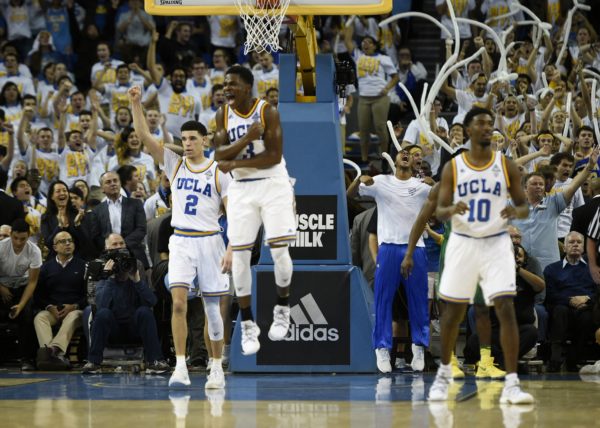Did UCLA Get the Defensive Memo?
Posted by RJ Abeytia on February 10th, 2017There was no mistaking the takeaway after Arizona came into Pauley Pavilion a few weekends ago and put on a 96-85 dismantling of UCLA‘s defense. Head coach Steve Alford said all the right things afterward, acknowledging and even extensively cataloging his team’s numerous deficiencies in defending their own bucket. With #5 Oregon coming to Westwood three games later, there was little evidence in the interim to suggest that much had changed. Immediately after the loss to the Wildcats, UCLA gave up 84 points to USC (the Pac-12’s seventh-best offense). Following that defeat, the conference’s ninth-rated offense, Washington State, dropped 79 points on the Bruins at an efficiency of 110.0. UCLA”s most recent game against Washington yielded just 66 points and an 80.0 efficiency, but the Huskies (the Pac-12’s 10th-best offense) are essentially a flaming clown car at this point.
Thursday night’s first half against the Ducks — which featured 50 percent shooting and a 133.3 efficiency rating — didn’t look much different. All the bad things that bad defensive teams consistently do (or fail to do) were on display. The Bruins were lax on the ball. Aaron Holiday entered the game, played hands-down defense, and watched two Oregon players bury jumpers right over him. UCLA wasn’t contesting on the ball and they weren’t doing much off the ball either. Alford tried a zone, but it was hard at times to discern whether his team was playing a slothful man or zone. The “switches” on the ball looked as much like each UCLA player being unwilling to pursue an Oregon player more than five feet in any direction than any particularly coordinated defensive effort.
Then Lonzo Ball started checking Dillon Brooks.
Tyler Dorsey hit a jumper to give the Ducks a 15-point lead with 14:16 to play. UCLA dominated the game from that point forward, closing with a 33-15 run over the rest of the game. With Ball shadowing Brooks all over the floor, Oregon’s best player finished with an 0-of-5 stretch that included four missed jumpers. Ball was an active defender, and Alford credited his play in the second half on that end with motivating his teammates to raise their defensive efforts. The open question is whether UCLA turned a defensive corner last night.
The first point to make is that expecting Ball to become a defensive trigger while playing 35 minutes per game, coordinating the Bruins’ offense and hitting clutch 30-footers seems like fool’s gold. TJ Leaf struggled mightily on the defensive end last night, and although the freshman has been a capable defender this year, teams that can bring out on the perimeter can expose him. Bryce Alford continues to be a favored defensive target against whoever he’s guarding, as Dorsey early and Payton Pritchard later went hard to the basket in those scenarios.
The bottom line is that, while defensive efficiency can be noisy, UCLA’s perimeter players other than Ball are below average defenders. Welsh and Leaf are not as weak in the post, but neither is very much above average either. The defensive numbers essentially tell us that UCLA’s rotation is comprised of only two average college defenders (Ball and Leaf) and four decidedly average (or below average) ones. This manifests itself in that the Bruins don’t typically force turnovers (second fewest in the Pac-12), and while they are slightly above average at blocking shots, there really isn’t any single player or attribute upon which Alford can build an elite (or even adequate) defense.
The good news is that, with the nation’s best offense, UCLA doesn’t have to carry a great defense to make a deep NCAA Tournament run this season. Still, this is very much a win Final Four or bust season for Alford in Westwood, and the Bruins will eventually need a better answer than to ask Ball do everything on both ends of the court.










































